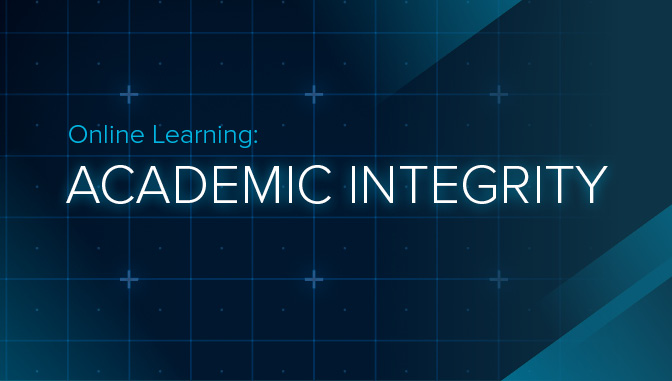Academic Integrity in an Online Environment

I can only imagine what faculty and administrators at on ground schools must be going through right now having to move hundreds of course sections online with only a few day’s notice. Having to quickly shift to the online environment can be stressful and present numerous challenges to these faculty who are used to teaching students face to face and having one-on-one discussions with students. Dealing with academic integrity issues has the potential to generate even more anxiety for these already stressed teachers.
Faculty who are new to online teaching may be concerned that students will be more likely to cheat in an online class than in an in-person class. According to George Watson and James Sottile’s. “Cheating in the Digital Age: Do Students Cheat More in Online Courses?” research confirms that students are no more likely to cheat in an online course than in a face-to-face course, although students in online courses are more likely to cheat on online tests or quizzes by getting answers from each other. In his article, “Let Your Students Cheat on Exams,” Wes Maciejewski suggests that we “let” students cheat by allowing them to use the resources that technology makes available and focus on modifying existing summative assessments to ask deeper and more conceptual questions. In the current situation, if faculty are able to roll out their online course a week at a time through the end of the semester, they may be able to redesign at least some assessments to take advantage of the learning management system (LMS) and other technologies and ask the students probing questions that will challenge them to think about the subject at hand. Assessments designed to encourage students to come up with their own topic, explore their own interests, or build on work they have previously done in class are also less likely to result in cheating.
Try as we may to entice students with thought-provoking and creative assessments, some of them will cheat or plagiarize. When this happens, you can generally handle academic integrity violations in online courses using the same processes that are used for in-person courses with the major difference being you will not be able to talk to offending students face-to-face. Communication about questionable writing or suspicious test-taking activities will typically have to occur via email, telephone, or video conferencing.
Written conversations through email should be carefully crafted as they may come back to haunt you when a student is struggling to defend themselves. A phone call or video conference with a student can be an effective way to communicate particularly when the responses to a few questions may clear things up. Asking a student to explain something they wrote in a paper can be an effective way to determine if they actually authored the work themselves. Most LMS’s provide a video conferencing tool such as Collaborate or Zoom and once faculty have moved their courses to the online environment, it would be wise to spend a few minutes becoming familiar with the communication tools that are available.
Less experienced college students may not always be aware they have cheated and the conversation with them may be more of a teachable moment than one with a punitive outcome. Forgetting to reference a source or using material they wrote for another paper are common examples of this. Providing rubrics is a way to make sure the students have a clear understanding of not only what they are supposed to do in an assignment but also how the assignment will be graded. It is important to reinforce messaging about academic integrity with every assignment.
This is also a great time to take advantage of the technology available to help identify cheating and plagiarism. Products like Turnitin Feedback Studio and the recently released Authorship Investigate can help the investigation of suspicious papers and identify those that may not have been written by the student (contract cheating) by comparing and analyzing meta-data from the paper against other work submitted to Turnitin by the student.
In summary, the same standards for cheating and plagiarism should be maintained and enforced in the online class that are used in the classroom. Effective and consistent communication with students is critical as well as communication between faculty and department chairs or other administration who support academic integrity issues. It’s important for department chairs and administrators to clearly define the roles of the online faculty member and make sure they know when they need to bring their department chair or other support staff into the conversation with the student.



